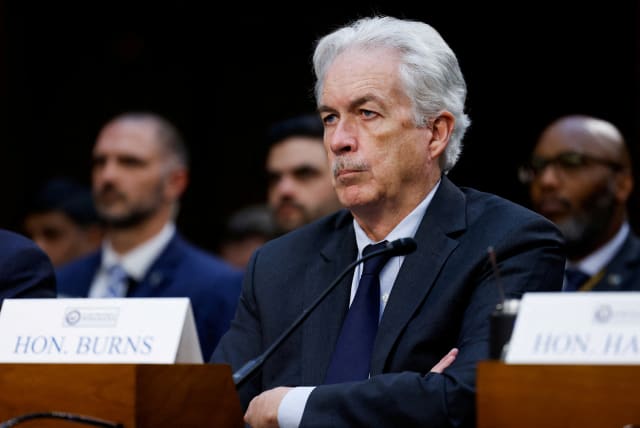CIA Director Burns holds Doha talks on new deal, Egypt pushes mini release

Sisi also said that talks should resume within ten days of implementing the temporary ceasefire in an effort to reach a permanent one.
CIA Director William Burns is holding talks in Doha on the possibility of a new wide-ranging hostage deal, while Egyptian President Abdel Fattah al-Sisi has proposed a mini-agreement to secure the freedom of four of the 101 captives.
“The purpose is to kick-start wider negotiations,” a source told The Jerusalem Post.
On the table in Doha in the Burns talks with Mossad Chief David Barnea and Qatari Prime Minister Mohammad Al-Thani is also the issue of an IDF-Hezbollah ceasefire based on UN Security Council Resolution 1701, according to a report by the Lebanese Broadcast Corporation International.
In advance of the Doha parley, US Secretary of State Antony Blinken met with London caretaker Lebanese Prime Minister Najib Makati on Friday, after visiting Qatar on Thursday.
The two ceasefire initiatives, however, have remained separate even though they are under discussion in the same talks. Sisi spoke in Cairo on Sunday of an initial two-day ceasefire in Gaza to exchange four Israeli hostages of Hamas for some Palestinian prisoners.
Speaking alongside Algerian President Abdelmadjid Tebboune during a press conference in Cairo, Sisi also said that overall hostage talks should resume within 10 days of implementing the temporary ceasefire in an effort to reach a permanent one.
There was no immediate comment from Israel or Hamas, but a Palestinian official close to the mediation effort told Reuters: "I expect Hamas would listen to the new offers, but it remains determined that any agreement must end the war and get Israeli forces out of Gaza."
Continuous negotiations
The US and Israel have been hopeful that in the aftermath of the IDF’s assassination of Hamas leader Yahya Sinwar earlier this month, it is now possible to make a deal.A Palestinian source based in Qatar has stated that in the aftermath of Sinwar’s death, there is a sense among Gaza officials that they have “nothing left to lose.” But Hamas has still stood firm in its position that any deal must include a permanent ceasefire and a complete IDF withdrawal from Gaza.Israel has insisted that Hamas must be ousted from Gaza before any permanent ceasefire is in place. Still, Barnea is expected to discuss with Burns and al-Thani a proposal for a wide-ranging deal to free all the 101 hostages, although it’s unclear if this would happen all at once or in stages.Defense Minister Yoav Gallant said the time had come for Israel to make painful concessions for a deal when he spoke at a state ceremony marking the anniversary, according to the Hebrew calendar, of the Hamas-led invasion of southern Israel during which the hostages were seized.“In carrying out our moral and ethical duty – to return the hostages to their homes, painful compromises are required,” Gallant said.Gallant has been at odds with Prime Minister Benjamin Netanyahu about the concessions needed to make a deal, urging greater flexibility than the Prime Minister has publicly displayed. Security officials in the last months have said that Netanyahu’s stances have made it harder to achieve a deal, even as the United States has stressed that Sinwar had been the stumbling block to a deal.Gallant said on Sunday, “This is the place to point out that not every goal can be achieved only through military action; force is not a be-all and end-all.”At the same ceremony, Netanyahu said that returning the hostages to Israel “is a major goal of the war. It’s a sacred mission.” He stressed that “we will not rest until all of them, the living and the dead, return to us. We will return our living hostages to their families; we will return our dead captives to be buried in Israel.”Sunday’s talks mark the first high-level meeting since Hamas executed six of the hostages at the end of August, including Israeli-American citizen Hersh Goldberg-Polin, 23.Before his killing, the US had advanced a three-phase deal first unveiled at the end of May. It has yet to finalize all the details of even the first phase.At issue has been Hamas’s insistence that Israel must end the war and that the IDF must fully withdraw from all of Gaza, including the Philadelphi Corridor. The May deal had been designed to allow for a deal to partially get underway without dealing with some of the irreconcilable differences.There are now growing calls for the US to scrap the May deal, which always had a protracted timetable for a hostage release and to consider a new framework. Blinken himself hinted at this possibility last week.At Sunday’s meeting, Barnea is expected to promote a new deal he has worked on with the United States, Qatar, and Egypt. If the initial conversation he holds with Burns and Al-Thani goes well, then Egypt will join the conversation and a larger Israeli team will be sent to Doha.
Reuters contributed to this report.
Jerusalem Post Store
`; document.getElementById("linkPremium").innerHTML = cont; var divWithLink = document.getElementById("premium-link"); if (divWithLink !== null && divWithLink !== 'undefined') { divWithLink.style.border = "solid 1px #cb0f3e"; divWithLink.style.textAlign = "center"; divWithLink.style.marginBottom = "15px"; divWithLink.style.marginTop = "15px"; divWithLink.style.width = "100%"; divWithLink.style.backgroundColor = "#122952"; divWithLink.style.color = "#ffffff"; divWithLink.style.lineHeight = "1.5"; } } (function (v, i) { });

